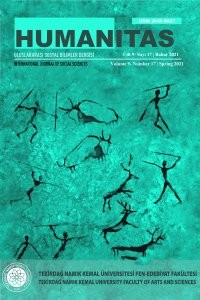Öz
The Middle East occupies considerable space in the US media and public debate after America’s recent wars in Afghanistan and Iraq. This paper examines Phil Klay’s delineation of these wars in his award-winning story collection, Redeployment (2014), in accordance with its approach to the value of life of both Americans and non-Americans and its perspective(s) on violence. It is Judith Butler’s contention that, in Western democracies, lives and deaths are treated with a different method; while the lives of western citizens are valued and grieved, the lives of non-citizens are devalued and ungrieved. I investigate the status of life/death in this work in the first section while the stories’ appropriation(s) to and justification of violence are elaborated in the second part. In these stories, fatalities among both Americans and locals are abundant and grief appears to dominate the scenes, however, in rather different way.
Anahtar Kelimeler
Kaynakça
- Alosman, M. I. M. 2020. Tarnished heroes: Faces of war in American fiction. Şarkiyat: Journal of Oriental Scientific Research, 12 (3)
- Antoon, S. (2013). The corpse washer. New Haven: Yale University Press.
- Asad, T. (2007). On suicide bombing. New York: Columbia University Press.
- Booth, A. (2019). Thank you for your service: Negotiating the civilian-military divide in Phil Klay’s Redeployment. Texas Studies in Literature and Language, 61 (2), 168-192.
- Butler, J. (2009). Frames of war: When is life grievable? London: Verso Books.
- Docx, E. (2014, March 26). Redeployment by Phil Klay review-‘Incendiary stories of war’. The Guardian. https://www.theguardian.com
- Filkins, D. (2014, March 6). The long road home. The New York Times. https://www.nytimes.com
- Gregory, D. (2004). The Colonial Present. Oxford: Blackwell.
- Klay, P. (2015). Redeployment: A Novel. New York: Penguin.
- Kunsa, A. (2017). Reconstructing the war in Iraq: Post-9/11 American war fiction in dialogue with official-media discourse, (Unpublished doctoral Dissertation). Duquesne University, Pennsylvania.
- Mayfield, T. O. (2016). Reflections on Redeployment. WLA; War, Literature and the Arts, 28, 1.
- Packer, G. (2014, March 31). Home fires: How soldiers write their wars. New Yorker, 7, 69-73. https://www.newyorker.com
- Petrovic, P. (2018). Beyond Appropriation: Arab, Coptic American, and Persian Subjectivities in BrianTurner’s Here, Bullet, Phil Klay’s Redeployment, and Elliot Ackerman’s Green on Blue”. War, Literature & the Arts: an international journal of the humanities, 30.
- Powers, K. (2013). The yellow birds. New York: Little, Brown and Company.
- Scranton, R. (2015, January 25). “The trauma hero: From Wilfred Owen to Redeployment and American Sniper”. Los Angeles Review of Books. https://lareviewofbooks.org
Öz
Ortadoğu, son 20 yılda, özellikle Amerika’nın Afganistan ve Irak’taki son savaşlarından sonra, ABD medyasında ve kamuoyunda önemli bir yer almaktadır. Bu makale, Phil Klay’ın bu savaşların tanımını, ödüllü öykü koleksiyonu olan Redeployment (2014)’da hem Amerikalıların hem de Amerikalı olmayanların yaşam değeri ve şiddet perspektifinden incelenmektedir. Judith Butler’a göre, Batılı demokrasilerde hayat ve ölümler farklı olarak değerlendiriliyor, Batılı vatandaşların hayatları daha değerli ve kederli olmalı düşünürken, vatandaş olmayanların hayatları daha az değerlidir. Birinci bölümde yaşam / ölüm durumu incelenirken, öykülerin uygunluğunu ve şiddetin gerekçesi ikinci bölümde ele alınmaktadır. Bu öykülerde, Amerikalılar ve yerliler arasındaki ölümler sahneler oldukça çoktur ve kederli görünmektedir.
Anahtar Kelimeler
Kaynakça
- Alosman, M. I. M. 2020. Tarnished heroes: Faces of war in American fiction. Şarkiyat: Journal of Oriental Scientific Research, 12 (3)
- Antoon, S. (2013). The corpse washer. New Haven: Yale University Press.
- Asad, T. (2007). On suicide bombing. New York: Columbia University Press.
- Booth, A. (2019). Thank you for your service: Negotiating the civilian-military divide in Phil Klay’s Redeployment. Texas Studies in Literature and Language, 61 (2), 168-192.
- Butler, J. (2009). Frames of war: When is life grievable? London: Verso Books.
- Docx, E. (2014, March 26). Redeployment by Phil Klay review-‘Incendiary stories of war’. The Guardian. https://www.theguardian.com
- Filkins, D. (2014, March 6). The long road home. The New York Times. https://www.nytimes.com
- Gregory, D. (2004). The Colonial Present. Oxford: Blackwell.
- Klay, P. (2015). Redeployment: A Novel. New York: Penguin.
- Kunsa, A. (2017). Reconstructing the war in Iraq: Post-9/11 American war fiction in dialogue with official-media discourse, (Unpublished doctoral Dissertation). Duquesne University, Pennsylvania.
- Mayfield, T. O. (2016). Reflections on Redeployment. WLA; War, Literature and the Arts, 28, 1.
- Packer, G. (2014, March 31). Home fires: How soldiers write their wars. New Yorker, 7, 69-73. https://www.newyorker.com
- Petrovic, P. (2018). Beyond Appropriation: Arab, Coptic American, and Persian Subjectivities in BrianTurner’s Here, Bullet, Phil Klay’s Redeployment, and Elliot Ackerman’s Green on Blue”. War, Literature & the Arts: an international journal of the humanities, 30.
- Powers, K. (2013). The yellow birds. New York: Little, Brown and Company.
- Scranton, R. (2015, January 25). “The trauma hero: From Wilfred Owen to Redeployment and American Sniper”. Los Angeles Review of Books. https://lareviewofbooks.org
Ayrıntılar
| Birincil Dil | İngilizce |
|---|---|
| Bölüm | Tüm Sayı |
| Yazarlar | |
| Yayımlanma Tarihi | 15 Mart 2021 |
| Yayımlandığı Sayı | Yıl 2021 Cilt: 9 Sayı: 17 |
Cited By
Negotiating Heroism in Ben Fountain's Billy Lynn's Long Halftime Walk
International Journal of Social Inquiry
https://doi.org/10.37093/ijsi.1107933









